

The Day Program: Short Films
Location: UVM's Davis Center (Williams' Family Room)
11 a.m.-2 p.m.
Film Festival Poster
God Sleeps in Rwanda Kimberlee Acquaro,
Stacy Sherman (Rwanda/USA) 28'30" 2005
Show times: 12:00 and 1:45 p.m.
 The
1994 Rwandan genocide left the country nearly seventy percent female, handing
Rwanda's women an extraordinary burden and an unprecedented opportunity. An
inspiring story of loss and redemption, God Sleeps in Rwanda focuses on the
spirit of women survivors to overcome the genocide's legacy of grief and loss.
The film follows five courageous women as they rebuild their lives and, in doing
so, redefine women‚s roles in Rwandan society and bring hope to a wounded nation.
The
1994 Rwandan genocide left the country nearly seventy percent female, handing
Rwanda's women an extraordinary burden and an unprecedented opportunity. An
inspiring story of loss and redemption, God Sleeps in Rwanda focuses on the
spirit of women survivors to overcome the genocide's legacy of grief and loss.
The film follows five courageous women as they rebuild their lives and, in doing
so, redefine women‚s roles in Rwandan society and bring hope to a wounded nation.
KUMARI - THE LIVING GODDESSES OF NEPAL
Tassia Kobylinska (Nepal/UK) 26' 2005
Showtime: 11:00 a.m
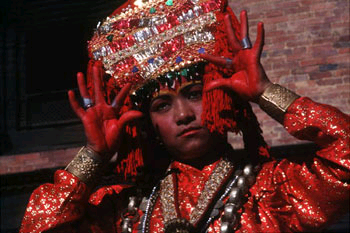 A
little girl lives alone in a temple in Kathmandu. Every day people come to worship
her and pray for protection. They believe that until she reaches puberty, she
is the living embodiment of the goddess Taleju and protects the kingdom of Nepal.
The ancient tradition of the virgin Kumari means that girls as young as three
spend their childhood living in a temple where they are worshipped and revered
as a living goddess. Their power is such that they are believed to be the protector
of the country and the king. But what happens to these girls when they grow
into young women who menstruate and are therefore no longer valid as goddesses?
Have they suffered a lost childhood, isolated from their peers, their families,
school and everyday life? This richly visual documentary includes astonishing
interviews with the living goddess and her family, ex-goddesses, child rights
workers and worshippers in Nepal and provides insight into a mysterious life
against the glorious background of the Himalayas.
A
little girl lives alone in a temple in Kathmandu. Every day people come to worship
her and pray for protection. They believe that until she reaches puberty, she
is the living embodiment of the goddess Taleju and protects the kingdom of Nepal.
The ancient tradition of the virgin Kumari means that girls as young as three
spend their childhood living in a temple where they are worshipped and revered
as a living goddess. Their power is such that they are believed to be the protector
of the country and the king. But what happens to these girls when they grow
into young women who menstruate and are therefore no longer valid as goddesses?
Have they suffered a lost childhood, isolated from their peers, their families,
school and everyday life? This richly visual documentary includes astonishing
interviews with the living goddess and her family, ex-goddesses, child rights
workers and worshippers in Nepal and provides insight into a mysterious life
against the glorious background of the Himalayas.
FIGHTING CHOLITAS
Mariam Jobrani, Kenneth Kraus, Teresa Deskins (Bolivia) 20'
2007
Showtime: 11:30 a.m.
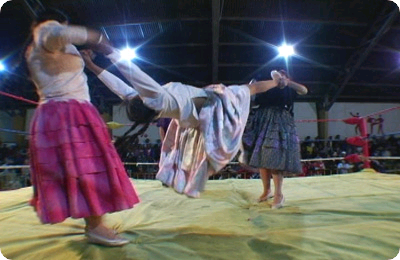 Fighting
Cholitas is short film about a group of bold and fierce female Bolivian wrestlers.These
indigenous women jump into the ring every Sunday in their traditional, vibrant,
multilayered skirts and perform the acrobatic maneuvers of Lucha Libre (a blend
of Mexican and American professional wrestling).Fighting Cholitas goes behind
the scenes to find out who these women are and what draws them to this unusual
sport. Every Sunday, hundreds of men, women and children pack the Multifunctional
Auditorium in El Alto, Bolivia, a sprawling lower income extension of La Paz.
They come to watch fights between good and evil where good is usually triumphant.
Fighting
Cholitas is short film about a group of bold and fierce female Bolivian wrestlers.These
indigenous women jump into the ring every Sunday in their traditional, vibrant,
multilayered skirts and perform the acrobatic maneuvers of Lucha Libre (a blend
of Mexican and American professional wrestling).Fighting Cholitas goes behind
the scenes to find out who these women are and what draws them to this unusual
sport. Every Sunday, hundreds of men, women and children pack the Multifunctional
Auditorium in El Alto, Bolivia, a sprawling lower income extension of La Paz.
They come to watch fights between good and evil where good is usually triumphant.
When Abortion was Illegal: Untold Stories
Dorothy Fadiman (USA) 28' 2004
Show times: 12:00 and 1:45 p.m
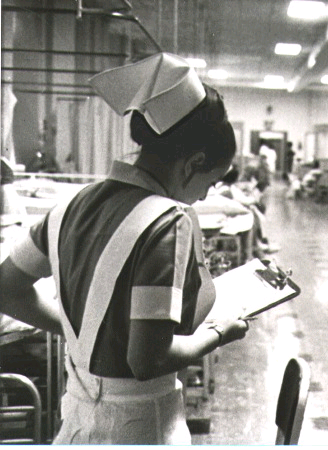 The
era of illegal abortion, roughly the period between the turn of the century
and the Roe v. Wade decision in 1973, has been a sealed chapter in women's history.
The profound aura of shame and fear surrounding unwanted pregnancies and abortions
before Roe v. Wade kept most women from ever admitting that they had had illegal
abortions. Women suffering complications from back alley or self-induced abortions
risked arrest if they admitted what they had done, as did their husbands and
doctors if they acknowledged compliance and aid. When Abortion was Illegal illuminates
this largely undocumented era and reveals the physical, emotional and legal
consequences of having an abortion when it was a criminal act.
The
era of illegal abortion, roughly the period between the turn of the century
and the Roe v. Wade decision in 1973, has been a sealed chapter in women's history.
The profound aura of shame and fear surrounding unwanted pregnancies and abortions
before Roe v. Wade kept most women from ever admitting that they had had illegal
abortions. Women suffering complications from back alley or self-induced abortions
risked arrest if they admitted what they had done, as did their husbands and
doctors if they acknowledged compliance and aid. When Abortion was Illegal illuminates
this largely undocumented era and reveals the physical, emotional and legal
consequences of having an abortion when it was a criminal act.
WOMAN BY WOMAN: NEW HOPE FOR THE VILLAGES OF INDIA
Dorothy Fadiman (India/USA) 27' 2002
Show times: 12:45 and 2:45 p.m.
 Description:
Woman by Woman: New hope for the villages of India documents the stories of
women in some of the least developed areas of rural India as they progress toward
personal freedom. Vivid images portray the humanity of the people, the beauty
of the countryside, as well as the toll of centuries of poverty. In the film
we meet women who are stepping forward, out of seclusion, to serve in their
communities. We also learn about Janani, a group that trains women to become
family planning counselors in their villages. These women become role models
by having the confidence to go beyond traditional boundaries. The film has recently
been awarded the FREDDIE, the "Oscar of the Medical/Health Care world".
Description:
Woman by Woman: New hope for the villages of India documents the stories of
women in some of the least developed areas of rural India as they progress toward
personal freedom. Vivid images portray the humanity of the people, the beauty
of the countryside, as well as the toll of centuries of poverty. In the film
we meet women who are stepping forward, out of seclusion, to serve in their
communities. We also learn about Janani, a group that trains women to become
family planning counselors in their villages. These women become role models
by having the confidence to go beyond traditional boundaries. The film has recently
been awarded the FREDDIE, the "Oscar of the Medical/Health Care world".
Abstaining From Reality
Daniele Anastasion and Wendy Turnbull (Kenya/Uganda/USA) 9'
2007
Show time: 12:30 p.m.
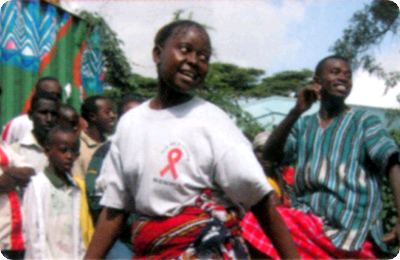 Description:
Filmed in Kenya and Uganda, this short documentary provides a snapshot of the
Bush administration's abstinence-only approach to HIV prevention as part of
its global HIV/AIDS assistance. Abstaining from Reality examines how these ideologically-driven
programs are actually endangering the lives of the people they're supposed to
be protecting. This policy is disconnected from the reality of the lives of
women and young people, who are disproportionately affected by the epidemic.
The film urges a balanced, comprehensive approach to preventing HIV infections
by providing full and accurate information and a range of services that empower
individuals to make informed decisions. Abstaining from Reality is a short documentary
that demonstrates in stark and powerful detail the grave consequences of the
United States' abstinence-only approach to HIV prevention.
Description:
Filmed in Kenya and Uganda, this short documentary provides a snapshot of the
Bush administration's abstinence-only approach to HIV prevention as part of
its global HIV/AIDS assistance. Abstaining from Reality examines how these ideologically-driven
programs are actually endangering the lives of the people they're supposed to
be protecting. This policy is disconnected from the reality of the lives of
women and young people, who are disproportionately affected by the epidemic.
The film urges a balanced, comprehensive approach to preventing HIV infections
by providing full and accurate information and a range of services that empower
individuals to make informed decisions. Abstaining from Reality is a short documentary
that demonstrates in stark and powerful detail the grave consequences of the
United States' abstinence-only approach to HIV prevention.
The Evening Program: Feature-Length Films The Livak Ballroom
of UVM's Davis Center Films begin at 6 p.m.
Behind the Labels: Garment Workers on U.S. Saipan
Tia Lessin (USA) 45' 2003
Show time: 6 p.m.
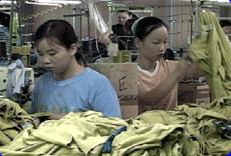 Description:
Lured by false promises and driven by desperation, thousands of Chinese and
Filipina women pay high fees to work in garment factories on the pacific island
of Saipan-the only U.S. territory exempt from labor and immigration laws. The
clothing they sew, bearing the 'Made in the USA' label, is shipped duty and
quota-free to the US for sale by retailers. Hidden camera footage, along with
personal stories, offers a glimpse into indentured labor and the workings of
the global sweatshop-where 14 hour shifts, payless paydays, and lock-downs are
routine. Narrated by Susan Sarandon, Behind the Labels takes the story from
the factory floor to the streets, where protesters worldwide wage an ongoing
battle against globalization.
Description:
Lured by false promises and driven by desperation, thousands of Chinese and
Filipina women pay high fees to work in garment factories on the pacific island
of Saipan-the only U.S. territory exempt from labor and immigration laws. The
clothing they sew, bearing the 'Made in the USA' label, is shipped duty and
quota-free to the US for sale by retailers. Hidden camera footage, along with
personal stories, offers a glimpse into indentured labor and the workings of
the global sweatshop-where 14 hour shifts, payless paydays, and lock-downs are
routine. Narrated by Susan Sarandon, Behind the Labels takes the story from
the factory floor to the streets, where protesters worldwide wage an ongoing
battle against globalization.
DAUGHTER FROM DANANG
Gail Dolgin and Vicente Franco (Vietnam/USA) 80' 2002
Show time: 7 p.m. Description:
 As
the Vietnam War drew to a close in 1975, thousands of Vietnamese and Amerasian
children were given up for adoption to the United States as part of 'Operation
Babylift'. Mai Thi Hiep, a seven year old was adopted by a single woman in Pulaski,
Tennessee and renamed as Heidi. Daughter from Danang tells the poignant story
of a Vietnamese mother and her Amerasian daughter separated by the war and reunited
twenty-two years later. Overwhelmed at meeting each other, mother and daughter
grapple with the reality of cultural differences and the years of separation.
Heidi's profound alienation from her Vietnamese past and her mother's desperate
need for financial assistance obscure their common love and longing. While many
documentaries have been made about Vietnam War, few have focused on the personal
stories of civilians, particularly women and children, whose lives were dramatically
affected by choices made in fear during times of chaos and panic.
As
the Vietnam War drew to a close in 1975, thousands of Vietnamese and Amerasian
children were given up for adoption to the United States as part of 'Operation
Babylift'. Mai Thi Hiep, a seven year old was adopted by a single woman in Pulaski,
Tennessee and renamed as Heidi. Daughter from Danang tells the poignant story
of a Vietnamese mother and her Amerasian daughter separated by the war and reunited
twenty-two years later. Overwhelmed at meeting each other, mother and daughter
grapple with the reality of cultural differences and the years of separation.
Heidi's profound alienation from her Vietnamese past and her mother's desperate
need for financial assistance obscure their common love and longing. While many
documentaries have been made about Vietnam War, few have focused on the personal
stories of civilians, particularly women and children, whose lives were dramatically
affected by choices made in fear during times of chaos and panic.
Discovering Dominga
Patricia Flynn Guatemala/USA (58 minutes)
Showtime: 8 p.m.
 Description:
Denese Becker was a young housewife from small town America, living a seemingly
ordinary life, with an extraordinary story to tell: that of nine year old Indian
girl who witnesses her mother's murder, sees her newborn sibling die in her
care, and who then suppresses the memory for 18 years until she is driven to
discover the truth of her past. Discovering Dominga chronicles Becker, a young
Iowa immigrant, born a Maya Indian, who discovers she is a survivor of one of
the most horrific massacres in Guatemalan history, committed in 1982 against
Maya Indian villagers. The film follows her emotional odyssey of self-discovery
and political awakening, and sheds light on what the United Nations termed genocide
against one of this hemisphere's largest indigenous minorities.
Description:
Denese Becker was a young housewife from small town America, living a seemingly
ordinary life, with an extraordinary story to tell: that of nine year old Indian
girl who witnesses her mother's murder, sees her newborn sibling die in her
care, and who then suppresses the memory for 18 years until she is driven to
discover the truth of her past. Discovering Dominga chronicles Becker, a young
Iowa immigrant, born a Maya Indian, who discovers she is a survivor of one of
the most horrific massacres in Guatemalan history, committed in 1982 against
Maya Indian villagers. The film follows her emotional odyssey of self-discovery
and political awakening, and sheds light on what the United Nations termed genocide
against one of this hemisphere's largest indigenous minorities.
 The
1994 Rwandan genocide left the country nearly seventy percent female, handing
Rwanda's women an extraordinary burden and an unprecedented opportunity. An
inspiring story of loss and redemption, God Sleeps in Rwanda focuses on the
spirit of women survivors to overcome the genocide's legacy of grief and loss.
The film follows five courageous women as they rebuild their lives and, in doing
so, redefine women‚s roles in Rwandan society and bring hope to a wounded nation.
The
1994 Rwandan genocide left the country nearly seventy percent female, handing
Rwanda's women an extraordinary burden and an unprecedented opportunity. An
inspiring story of loss and redemption, God Sleeps in Rwanda focuses on the
spirit of women survivors to overcome the genocide's legacy of grief and loss.
The film follows five courageous women as they rebuild their lives and, in doing
so, redefine women‚s roles in Rwandan society and bring hope to a wounded nation.


 A
little girl lives alone in a temple in Kathmandu. Every day people come to worship
her and pray for protection. They believe that until she reaches puberty, she
is the living embodiment of the goddess Taleju and protects the kingdom of Nepal.
The ancient tradition of the virgin Kumari means that girls as young as three
spend their childhood living in a temple where they are worshipped and revered
as a living goddess. Their power is such that they are believed to be the protector
of the country and the king. But what happens to these girls when they grow
into young women who menstruate and are therefore no longer valid as goddesses?
Have they suffered a lost childhood, isolated from their peers, their families,
school and everyday life? This richly visual documentary includes astonishing
interviews with the living goddess and her family, ex-goddesses, child rights
workers and worshippers in Nepal and provides insight into a mysterious life
against the glorious background of the Himalayas.
A
little girl lives alone in a temple in Kathmandu. Every day people come to worship
her and pray for protection. They believe that until she reaches puberty, she
is the living embodiment of the goddess Taleju and protects the kingdom of Nepal.
The ancient tradition of the virgin Kumari means that girls as young as three
spend their childhood living in a temple where they are worshipped and revered
as a living goddess. Their power is such that they are believed to be the protector
of the country and the king. But what happens to these girls when they grow
into young women who menstruate and are therefore no longer valid as goddesses?
Have they suffered a lost childhood, isolated from their peers, their families,
school and everyday life? This richly visual documentary includes astonishing
interviews with the living goddess and her family, ex-goddesses, child rights
workers and worshippers in Nepal and provides insight into a mysterious life
against the glorious background of the Himalayas.  Fighting
Cholitas is short film about a group of bold and fierce female Bolivian wrestlers.These
indigenous women jump into the ring every Sunday in their traditional, vibrant,
multilayered skirts and perform the acrobatic maneuvers of Lucha Libre (a blend
of Mexican and American professional wrestling).Fighting Cholitas goes behind
the scenes to find out who these women are and what draws them to this unusual
sport. Every Sunday, hundreds of men, women and children pack the Multifunctional
Auditorium in El Alto, Bolivia, a sprawling lower income extension of La Paz.
They come to watch fights between good and evil where good is usually triumphant.
Fighting
Cholitas is short film about a group of bold and fierce female Bolivian wrestlers.These
indigenous women jump into the ring every Sunday in their traditional, vibrant,
multilayered skirts and perform the acrobatic maneuvers of Lucha Libre (a blend
of Mexican and American professional wrestling).Fighting Cholitas goes behind
the scenes to find out who these women are and what draws them to this unusual
sport. Every Sunday, hundreds of men, women and children pack the Multifunctional
Auditorium in El Alto, Bolivia, a sprawling lower income extension of La Paz.
They come to watch fights between good and evil where good is usually triumphant.
 The
era of illegal abortion, roughly the period between the turn of the century
and the Roe v. Wade decision in 1973, has been a sealed chapter in women's history.
The profound aura of shame and fear surrounding unwanted pregnancies and abortions
before Roe v. Wade kept most women from ever admitting that they had had illegal
abortions. Women suffering complications from back alley or self-induced abortions
risked arrest if they admitted what they had done, as did their husbands and
doctors if they acknowledged compliance and aid. When Abortion was Illegal illuminates
this largely undocumented era and reveals the physical, emotional and legal
consequences of having an abortion when it was a criminal act.
The
era of illegal abortion, roughly the period between the turn of the century
and the Roe v. Wade decision in 1973, has been a sealed chapter in women's history.
The profound aura of shame and fear surrounding unwanted pregnancies and abortions
before Roe v. Wade kept most women from ever admitting that they had had illegal
abortions. Women suffering complications from back alley or self-induced abortions
risked arrest if they admitted what they had done, as did their husbands and
doctors if they acknowledged compliance and aid. When Abortion was Illegal illuminates
this largely undocumented era and reveals the physical, emotional and legal
consequences of having an abortion when it was a criminal act.  Description:
Woman by Woman: New hope for the villages of India documents the stories of
women in some of the least developed areas of rural India as they progress toward
personal freedom. Vivid images portray the humanity of the people, the beauty
of the countryside, as well as the toll of centuries of poverty. In the film
we meet women who are stepping forward, out of seclusion, to serve in their
communities. We also learn about Janani, a group that trains women to become
family planning counselors in their villages. These women become role models
by having the confidence to go beyond traditional boundaries. The film has recently
been awarded the FREDDIE, the "Oscar of the Medical/Health Care world".
Description:
Woman by Woman: New hope for the villages of India documents the stories of
women in some of the least developed areas of rural India as they progress toward
personal freedom. Vivid images portray the humanity of the people, the beauty
of the countryside, as well as the toll of centuries of poverty. In the film
we meet women who are stepping forward, out of seclusion, to serve in their
communities. We also learn about Janani, a group that trains women to become
family planning counselors in their villages. These women become role models
by having the confidence to go beyond traditional boundaries. The film has recently
been awarded the FREDDIE, the "Oscar of the Medical/Health Care world".  Description:
Filmed in Kenya and Uganda, this short documentary provides a snapshot of the
Bush administration's abstinence-only approach to HIV prevention as part of
its global HIV/AIDS assistance. Abstaining from Reality examines how these ideologically-driven
programs are actually endangering the lives of the people they're supposed to
be protecting. This policy is disconnected from the reality of the lives of
women and young people, who are disproportionately affected by the epidemic.
The film urges a balanced, comprehensive approach to preventing HIV infections
by providing full and accurate information and a range of services that empower
individuals to make informed decisions. Abstaining from Reality is a short documentary
that demonstrates in stark and powerful detail the grave consequences of the
United States' abstinence-only approach to HIV prevention.
Description:
Filmed in Kenya and Uganda, this short documentary provides a snapshot of the
Bush administration's abstinence-only approach to HIV prevention as part of
its global HIV/AIDS assistance. Abstaining from Reality examines how these ideologically-driven
programs are actually endangering the lives of the people they're supposed to
be protecting. This policy is disconnected from the reality of the lives of
women and young people, who are disproportionately affected by the epidemic.
The film urges a balanced, comprehensive approach to preventing HIV infections
by providing full and accurate information and a range of services that empower
individuals to make informed decisions. Abstaining from Reality is a short documentary
that demonstrates in stark and powerful detail the grave consequences of the
United States' abstinence-only approach to HIV prevention.  Description:
Lured by false promises and driven by desperation, thousands of Chinese and
Filipina women pay high fees to work in garment factories on the pacific island
of Saipan-the only U.S. territory exempt from labor and immigration laws. The
clothing they sew, bearing the 'Made in the USA' label, is shipped duty and
quota-free to the US for sale by retailers. Hidden camera footage, along with
personal stories, offers a glimpse into indentured labor and the workings of
the global sweatshop-where 14 hour shifts, payless paydays, and lock-downs are
routine. Narrated by Susan Sarandon, Behind the Labels takes the story from
the factory floor to the streets, where protesters worldwide wage an ongoing
battle against globalization.
Description:
Lured by false promises and driven by desperation, thousands of Chinese and
Filipina women pay high fees to work in garment factories on the pacific island
of Saipan-the only U.S. territory exempt from labor and immigration laws. The
clothing they sew, bearing the 'Made in the USA' label, is shipped duty and
quota-free to the US for sale by retailers. Hidden camera footage, along with
personal stories, offers a glimpse into indentured labor and the workings of
the global sweatshop-where 14 hour shifts, payless paydays, and lock-downs are
routine. Narrated by Susan Sarandon, Behind the Labels takes the story from
the factory floor to the streets, where protesters worldwide wage an ongoing
battle against globalization. As
the Vietnam War drew to a close in 1975, thousands of Vietnamese and Amerasian
children were given up for adoption to the United States as part of 'Operation
Babylift'. Mai Thi Hiep, a seven year old was adopted by a single woman in Pulaski,
Tennessee and renamed as Heidi. Daughter from Danang tells the poignant story
of a Vietnamese mother and her Amerasian daughter separated by the war and reunited
twenty-two years later. Overwhelmed at meeting each other, mother and daughter
grapple with the reality of cultural differences and the years of separation.
Heidi's profound alienation from her Vietnamese past and her mother's desperate
need for financial assistance obscure their common love and longing. While many
documentaries have been made about Vietnam War, few have focused on the personal
stories of civilians, particularly women and children, whose lives were dramatically
affected by choices made in fear during times of chaos and panic.
As
the Vietnam War drew to a close in 1975, thousands of Vietnamese and Amerasian
children were given up for adoption to the United States as part of 'Operation
Babylift'. Mai Thi Hiep, a seven year old was adopted by a single woman in Pulaski,
Tennessee and renamed as Heidi. Daughter from Danang tells the poignant story
of a Vietnamese mother and her Amerasian daughter separated by the war and reunited
twenty-two years later. Overwhelmed at meeting each other, mother and daughter
grapple with the reality of cultural differences and the years of separation.
Heidi's profound alienation from her Vietnamese past and her mother's desperate
need for financial assistance obscure their common love and longing. While many
documentaries have been made about Vietnam War, few have focused on the personal
stories of civilians, particularly women and children, whose lives were dramatically
affected by choices made in fear during times of chaos and panic.  Description:
Denese Becker was a young housewife from small town America, living a seemingly
ordinary life, with an extraordinary story to tell: that of nine year old Indian
girl who witnesses her mother's murder, sees her newborn sibling die in her
care, and who then suppresses the memory for 18 years until she is driven to
discover the truth of her past. Discovering Dominga chronicles Becker, a young
Iowa immigrant, born a Maya Indian, who discovers she is a survivor of one of
the most horrific massacres in Guatemalan history, committed in 1982 against
Maya Indian villagers. The film follows her emotional odyssey of self-discovery
and political awakening, and sheds light on what the United Nations termed genocide
against one of this hemisphere's largest indigenous minorities.
Description:
Denese Becker was a young housewife from small town America, living a seemingly
ordinary life, with an extraordinary story to tell: that of nine year old Indian
girl who witnesses her mother's murder, sees her newborn sibling die in her
care, and who then suppresses the memory for 18 years until she is driven to
discover the truth of her past. Discovering Dominga chronicles Becker, a young
Iowa immigrant, born a Maya Indian, who discovers she is a survivor of one of
the most horrific massacres in Guatemalan history, committed in 1982 against
Maya Indian villagers. The film follows her emotional odyssey of self-discovery
and political awakening, and sheds light on what the United Nations termed genocide
against one of this hemisphere's largest indigenous minorities.